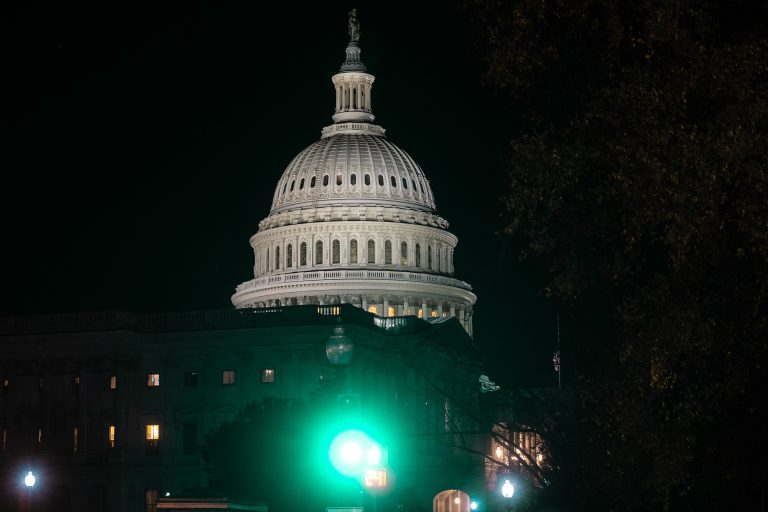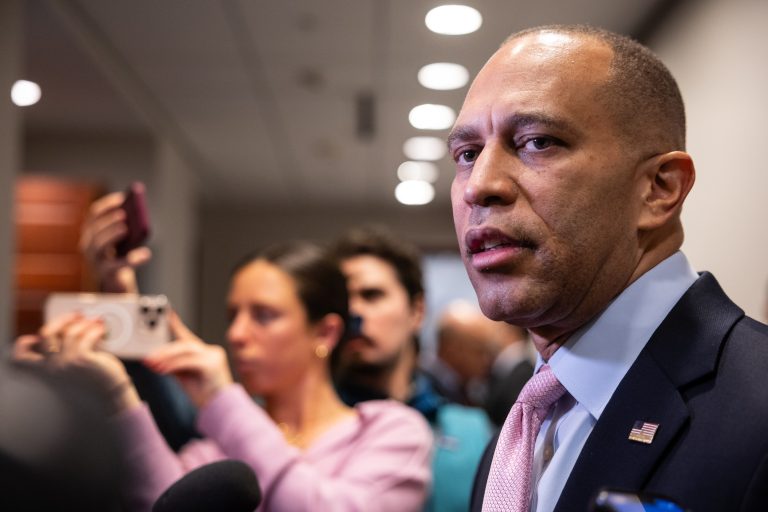House Democrats are back at work — and, boy, are they mad.
They’re mad at the Senate Democrats who cut them out of negotiations and cut the deal to reopen the government after a record 43-day shutdown. They’re mad at Speaker Mike Johnson for keeping the House out of session all that time for what they’re calling a “seven-week paid vacation.” And they’re mad that, after all that, there’s still no clear path forward on meeting their key demand — an extension of health insurance subsidies that expire next month.
Their fury was evident across the Capitol in the 24 hours leading up to Wednesday’s decisive vote reopening the government as they took stock of a long, bitter fight that ended without a clear win and left many spoiling for fights and in little mood to compromise with Republicans.
That sour mood stands to linger with another shutdown deadline approaching in January and members hoping to somehow forge a bipartisan compromise on the insurance subsidies in the coming weeks.
“The Senate says they will have a vote [on the subsidies],” said Rep. Rosa DeLauro (D-Conn.), the top Democrat on the Appropriations Committee. “Do I trust any of them? Hell no.”
Speaking to reporters ahead of the final vote Wednesday, House Minority Leader Hakeem Jeffries vowed to keep up the fight — even as Democrats’ procedural options remain limited. One casualty of the shutdown was Jeffries’ once-cordial relationship with Johnson, which descended into mudslinging as the standoff ground on and frustration mounted.
“Institutionally, Mike Johnson did great damage to the House of Representatives by castrating his Republican majority and keeping his extremists on a taxpayer-funded vacation for more than seven weeks,” Jeffries said.
The “vacation” epithet was a popular one for Democrats returning to the Capitol this week, and it grated on the ears of Republicans who blame the other party’s intransigence for the record shutdown.
During a late-night hearing Tuesday, Rules Committee Chair Virginia Foxx (R-N.C.) interrupted Rep. Yassamin Ansari (D-Ariz.) after she sarcastically welcomed Republicans back from the extended recess.
“I am sick and tired of hearing you say we had an eight-week vacation,” Foxx said. “I worked every day — I don’t know about you — but I don’t want to hear another soul say that.”
Ansari refused to back off: “I hope you all enjoyed yourselves while American families [were] terrified that their health insurance premiums were going to double or triple,” she fired back
Adding to the partisan tension surrounding the shutdown was Johnson’s decision not only to keep the House out of session but to also not swear in Rep. Adelita Grijalva (D-Ariz) until the shutdown ended.
Democrats packed the House floor for Grijalva’s swearing-in Wednesday. Rep. Greg Stanton (D-Ariz.), introducing his new colleague, at first joked about how “it has been a minute since we have all been together” before levying more heated attacks on Johnson.
“At one point, the speaker said, ‘Bless her heart, she is representative-elect, she doesn’t know how it works around here,’” Stanton said. “Bless his heart, because here’s how it should work … When the American people vote, this chamber respects their will and seats them immediately. Politics should never come into play.”
In her own speech, Grijalva criticized Republican leaders for denying her district “access to the basic services that every constituent deserves.”
“This is an abuse of power,” she said. “One individual should not be able to unilaterally obstruct the swearing in of a duly elected member of congress for political reasons.”
But Grijalva and Johnson were all smiles when they posed together after she was formally sworn into the House.
“I really like this lady. I think she’s going to be an excellent member of Congress,” Johnson said.
Republicans displayed some anger of their own Wednesday. Rep. Mike Lawler (R-N.Y.) used his floor time to decry Democrats for their “extremist” positions and sparking the record shutdown. “You should all be ashamed of yourselves for inflicting this pain on the American people … not paying our troops, our federal employees, our air traffic controllers,” he shouted. “It’s a disgrace, and you should all hang your heads in shame.”
That prompted a warning from Rep. Steve Womack (R-Ark.), who was presiding over the House at the time, to cool things down: “I fully recognize that there’s a lot of pent-up anxiety and emotions have been elevated somewhat, but please.”
The tensions stand to color the House’s work over the coming weeks. Johnson is promising additional session days and late nights to catch up on the weeks of lost legislative time.
To jump-start progress on the expiring insurance subsidies, Democrats launched a longshot procedural maneuver known as a discharge petition to force a three-year extension of the credits for a vote, but it is unlikely enough Republicans will sign on to ensure its success. More likely, any compromise will have to be forged in the Senate, something in which House Democrats showed little faith this week.
And then there’s the next spending deadline, coming on Jan. 30, when many of the factors that led up to the shutdown over the last seven weeks are likely to be unchanged. Leading up to the 43-day shutdown, Democrats pushed for funding guardrails on the Trump administration in addition to the health care provisions — and got neither in the end.
“I do think at some point it is important for Democrats to have a backbone and really fight for the American people,” said Rep. Ilhan Omar (D-Minn.).
“I’m not going to vote to endorse their cruelty,” said Rep. Jim McGovern (D-Mass.) when asked about the prospect of another shutdown. “And that’s the way I view them not extending the ACA tax credits.”
Jeffries separately cautioned that a laundry list of other items on the House’s agenda, including passage of the annual defense authorization bill, could be threatened if Republicans cut Democrats out of the process.
“The business of the American people must continue, but the red line will be if Republicans continue to adopt the my-way-or-the-highway approach,” he said. “At that point, we’ll continue to say, ‘Get lost.’”


